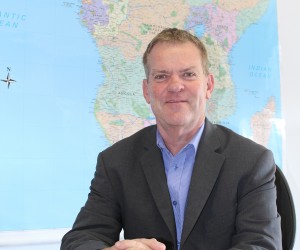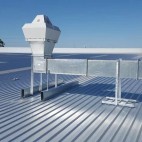A reliable and dependable power supply is essential for maintaining and sustaining any business, which in turn forms the basis for a stable and sustainable economy with year on year growth in GDP and employment. Power outages, no matter what their root cause, across the country and Sub-Saharan Africa pose challenges to this much needed economic growth.
2016 saw South Africa retain its 168th position out of 189 world economies for “Getting Electricity”1 which bears testament to the national grid’s challenges in maintaining a reliable supply of power. As South Africans, we all share these challenges.
This again stresses the importance of the critical need for alternative solutions in the energy sector in South Africa especially in sectors such as manufacturing and mining where a continuous dependable source of power is crucial to continued productivity.
Foreign direct investment into the country, however, is not entirely compromised as the country still fares well when it comes to ease of doing business. It ranks 73 globally and fourth in Sub-Saharan Africa; encouraging during difficult times.
“Many geographically remote operations within the mining sector that are situated at the extremes of the transmission network are choosing to go off the grid when it comes to power generation,” says Cummins Power Generation Director- CSARO, Kenny Gaynor. “Despite the fact that internationally-based companies bring foreign investment into the country, power interruptions are expensive and pose concerns as the unreliable electricity is not conducive to effective and sustainable business and Safety practices,” Gaynor explains.
Cummins is a global energy leader providing electrical power generation systems and complementary business units that design, manufacture, distribute and service diesel and natural gas engines and related technologies.
The pressurised mining industry has been severely compromised in recent times with lower commodity prices. Energy disruptions induced by power outages, planned or unplanned, can simply not be sustained.
Alternative solutions to ensure a sustainable power supply
Cummins has a range of alternative solutions to ensure productivity is not compromised during challenging energy situations. These temporary or permanent off-the-grid solutions ensure sustained productivity in the workplace particularly in those operations with critical loads. The company has developed state-of-the-art specialised pre-integrated generator sets, designed and manufactured to produce outputs from 8 kVA to 3750 kVA.
According to Gaynor, “Our power solutions are customised to suit the specific needs of the client or the operation,” for standby or prime applications. “Standby provides power to the operation in the event of a grid failure, so the duty is far lower. Generators designed for 20 to 40 hours of operation per month fall into this category, whereas our prime applications are entirely separate from the national grid suited to remote operations that do not have grid connectivity and these generators thus supply load power 24/7.” Better planning and a greater investment is required for prime application solutions as the entire outcome of the operation is dependent on the energy supply.
- The Cummins range of diesel generators and engines is geared towards small to medium and large applications; engineered to support a host of industries, fuel types and power ratings required. These generators are based on real-world applications; such as Commercial and Industrial, Residential, Marine, Rental Power, including those businesses that require continuous critical loads for a host of sectors ranging from Data Centres, Telecommunications to Banking.
- “Eskom has done a good job of balancing the need to interrupt power in areas to undertake maintenance, and at the same time ensure that as far as possible consumers are unaffected by these necessary interventions. We are in the middle of winter and the peak in annual demand; and to date Eskom has maintained generation capacity,” Gaynor says. “There are many other factors that can affect the reliable supply of electricity from the power station to the consumer. Cable theft results in power interruptions of many hours per single event and the increase in illegal connections to the municipal power supply creates additional unplanned demand that can cause sub-stations to trip out resulting in interventions that can take many hours to reset and restore power supply,” he explains.
- “A country’s electricity grid has three critical components: Generation, Transmission and Distribution. All three must be up and running simultaneously. But, keeping all three adequately maintained and efficient is a significant and geographically widespread task for any country. Any investment in increased capacity has to be planned, funded and implemented simultaneously in all three components. Expansion in any one is no good without expansion in the others,” he illustrates.
The key to success
Cummins offers a full and comprehensive range of services, including conceptualisation, design, construction, installation, commissioning, operation and maintenance. We highly recommend that a Cummins professional is dedicated to the site 24/7 to oversee the project. We stock as many essential parts on site to prevent problems and ensure we have minimum downtime and our comprehensive logistics supply chain will ensure that any additional parts required reach site in the shortest possible time. We also train relevant personnel to ensure the best outcome for our clients and their operations.”
The benefits of security of power to those businesses whose processes are critically dependent far outweigh the costs of investing in a back-up power system from Cummins. Firstly, operations and processes continue seamlessly, be they in a manufacturing environment or in a hospital theatre on the operating table. Many businesses, ranging from the informal sector to large corporates have, and are continuing to provide for necessary insurance against power outages. The costs of production interruptions and the real risks to human lives in hospitals coupled with the risks associated with compromised safety processes in mining and manufacturing sectors stemming from power outages far outweighs the Capex and Opex costs of providing for adequate back-up power from a world class supplier such as Cummins.
Cummins products are all backed by a comprehensive warranty with professional support from the Worldwide Dealer Network.
Cummins is able to provide a class-leading range of both diesel and gas powered generators with individual stand-alone units from 8 kVA to 3750 kVA. Configured and integrated to form multiple unit power plants, the range caters for any business application, regardless of site location. A key element of power generation systems is the continuous, reliable and ready supply of parts for ongoing maintenance and repairs. Customers need to consider this in making a decision on the choice of OEM to supply a generator. Cummins also partners with other technology developers such as solar, to create power generation in hybrid platforms that can reduce fuel costs and contribute to a greener and sustainable environment.
Cummins is able to design, construct, operate and maintain both continuous and stand-by power plants to safeguard against the inevitable negative effects of power interruptions. This is absolutely critical in power dependant operations such as Health Care, Airports and Harbours, Banking and Data Centres and Mining.
Cummins also invests in developing its people, and those of its customers. In conclusion Gaynor says, “In the Southern African region, the increase in the population of Cummins generators in the field at customers’ sites at various geographically spread locations has necessitated that Cummins increase its ongoing annual investment in training, people development and the provision of tooling and equipment to maintain their products.










